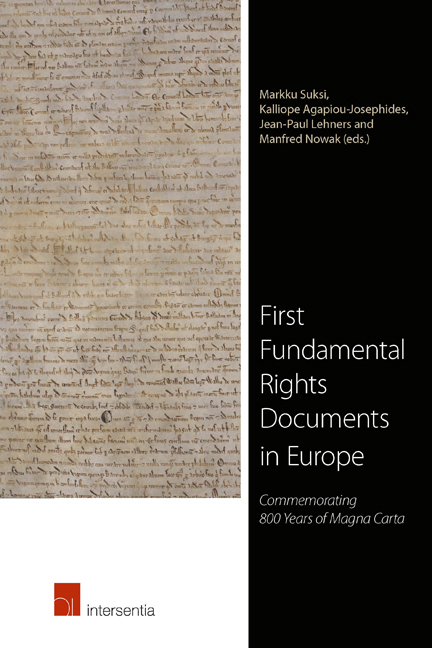Book contents
1 - Introduction
Published online by Cambridge University Press: 15 December 2017
Summary
In Europe, two famous sets of rights of a fundamental nature exist, the English Magna Carta of 1215 and the French Declaration of the Rights of Man and the Citizen of 1789. Does this mean that no corresponding fundamental rights documents were ever adopted or granted in the territories of the other current Member States of the European Union? This volume proposes to explore Europe's heritage in terms of fundamental rights, while contextualising and tracing their path and impact in the Member States of the European Union.
Until now, there has existed no overall understanding of the historical existence of fundamental rights documents in other parts of Europe than in England and France. The fundamental rights discourse has been so dominated by Magna Carta and the Declaration of 1789 that other possible developments have been overshadowed, if not almost completely sidelined. Yet when asked, persons knowledgeable in the legal history of their own country would often be able to identify at least some precursors to the fundamental rights currently in force on the basis of the constitution of the country, although unbroken lineage between the fundamental rights in force and the early antecedents may be impossible to establish.
By using the term fundamental rights, the intention here is to indicate that the searchlight is on those individual rights that define the position of the individual in a fundamental manner in particular in relation to the public authorities, but perhaps also generally in relation to powers that be. On that view, fundamental rights cover both individual rights established in documents of a constitutional nature and individual rights that appeared in norms of a more general nature. Fundamental rights are, from this perspective, rights that have emerged at the state or sub-state level, even in city-states (although in most cases, the current states did not exist at the time of the adoption of these documents).
Against this background, it can be said that there exists a general interest in and also a need for review of the historical documents concerning fundamental rights that can be found in the current Member States of the European Union. This interest and need is further enhanced by the fact that the fundamental rights that first evolved at a national level, however defined, gave the impetus for international human rights law after World War II.
- Type
- Chapter
- Information
- First Fundamental Rights Documents in EuropeCommemorating 800 Years of Magna Carta, pp. 1 - 8Publisher: IntersentiaPrint publication year: 2015



